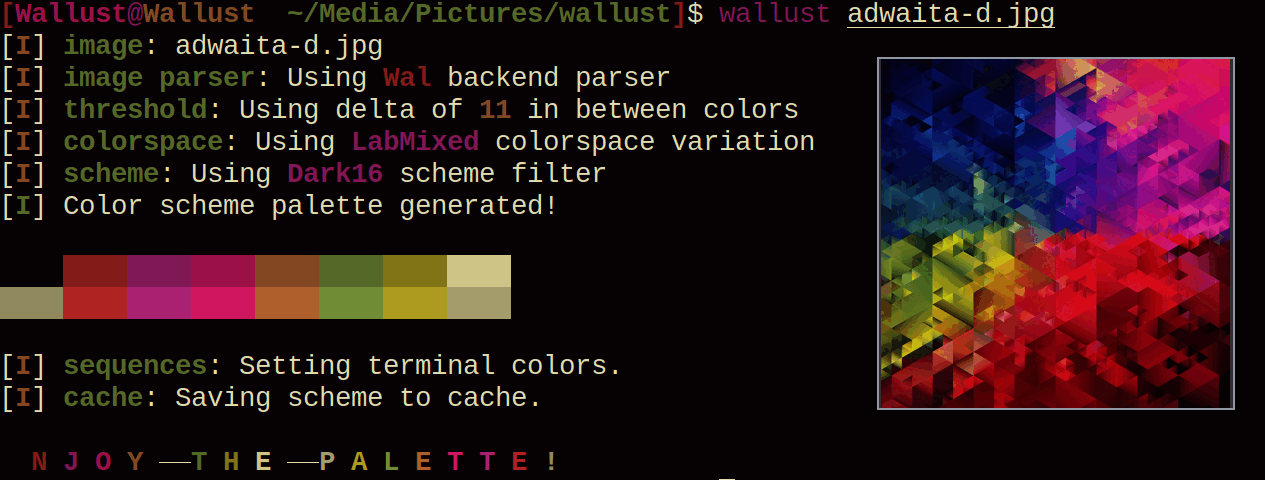





sources: rms by marco novo - linus talking - pixels - adwaita
It is recommended to clean the cache in a new major and minor release but is not required
If you don't have a config file, wallust will generate the
default config file
for you.
$XDG_CACHE_HOME or $HOME/.cache$HOME/Library/Caches{FOLDERID_LocalAppData}$XDG_CONFIG_HOME or $HOME/.config$HOME/Library/Application Support{FOLDERID_RoamingAppData}wallust.toml of this repo:
By default, wallust will send these sequences to all open terminals
(/dev/pts/). You can skip this with the -s or --skip-sequences flag.
When opening new terminals you will notice that the color sequences are not
applied. To solve this you can send the sequences yourself when your shell
opens. wallust will store the sequences in the cache directory as a file
called sequences, the usual way is to cat ~/.cache/wallust/sequences in
your .zshrc, .bashrc, etc.
You can use wallust generated colors in a program by templating the colors
in it's config file, like the following example:
```
...
set default-bg "{color2}"
set default-fg "{foreground}"
set statusbar-bg "{color4}"
set statusbar-fg "{color6}"
set inputbar-bg "{color1}"
Then add this file to `~/.config/wallust/` e.g. _~/.config/wallust/zathurarc_
(config directory defined by the platform) and add a new entry to `wallust.toml`
toml
[[entry]]
template = "zathurarc"
target = "~/.config/zathura/zathurarc"
```
NOTE: The template name doesn't have to match the target name: e.g. the
file could be named sample.conf, and thus the entry would have template =
"sample.conf", but the target can remain the same, e.g. target = "~/.config/zathurarc".
wallust my_wallpaper.png
Keep in mind that the git repo is constantly updated, if you wanna use git,
checkout to a stable version.
Go to the releases
page and download the .zip or .tar.gz repository. After extracting the contents,
go to the directory (cd MAYOR.MINOR.PATCH).
Then you can do the following, which moves the binary into your $CARGO_HOME/bin
cargo install --path .
or build it and copy the binary to one folder present in your $PATH like
/usr/local/bin
cargo build --release
cp -f ./target/release/wallust /usr/local/bin
cargo install wallust
This will use the lastest version
If you are using NetBSD, a native package is available from the official repositories. To install it, simply run:
pkgin install wallust
for more, grep the src for TODO rg TODO
- release binaries - figure out woodkeeper codeberg CI
- Think about using k means algo
similar to pigmnts (just without seg faulting :p)
- use thiserror for errors in the modules (there aren't that many)